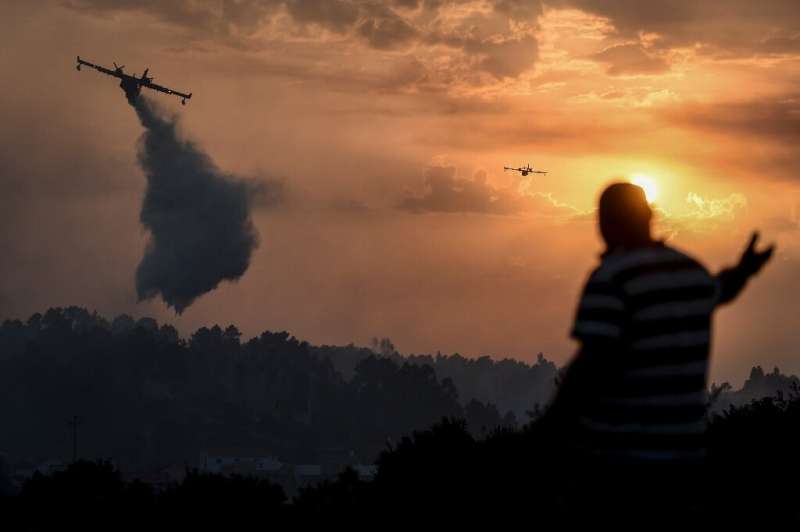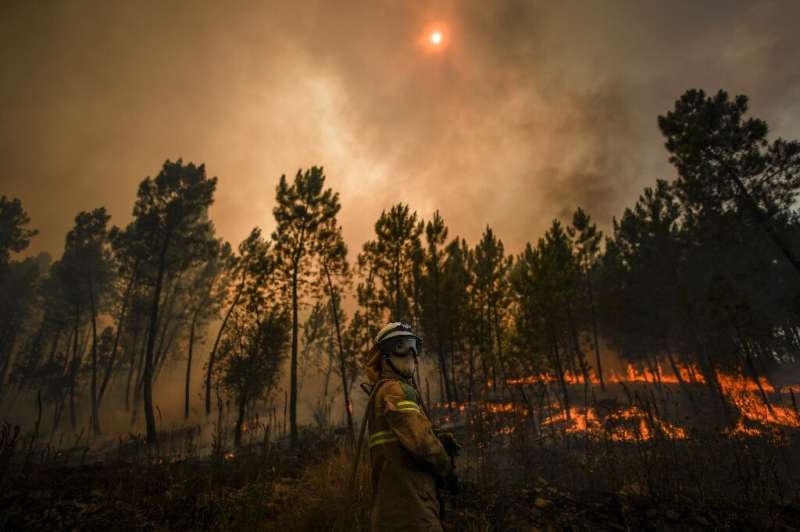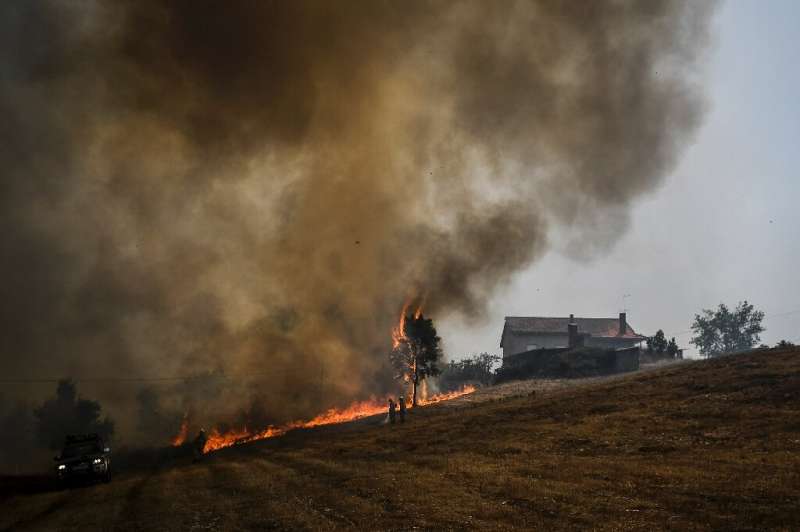The forests are largely eucalyptus, a highly flammable wood used in the paper industry
Firefighters aided by overnight rain on Tuesday brought under control massive wildfires raging for four days in a central region of Portugal where dozens of people were killed in huge blazes in 2017.
Nearly 1,100 firefighters were still deployed to completely put out the blazes, which ripped through the heavily forested Castelo Branco region, 200 kilometres (120 miles) north of Lisbon, said commander Luis Belo Costa of the civil protection agency.
"The fire has been controlled. It is normal that during the afternoon it could become reactivated in some places but that is part of the process," he told a news conference.
Light rains overnight raised humidity levels, aiding the battle against the blazes which have scorched large areas and left a trail of blackened destruction.
The authorities suspect the fires which broke out on Saturday amid scorching temperatures were started deliberately.
Portugal's civil protection agency had said on Monday morning the wildfires were "90 percent controlled", but strong winds fanned the flames into life again in the afternoon.
Winds are forecast to pick up on Tuesday but "they won't be as aggressive as yesterday", Costa said.
At least 7,000 hectares (17,300 acres) have so far been scorched, according to the EU's European Forest Fire Information System.
Forty-one people including several firefighters have been injured since the wildfires broke out in Castelo Branco, with most suffering smoke inhalation, according to emergency service INEM.
Hundreds of firefighters were deployed to fight the blazes in the heavily forested Castelo Branco region
A farmer who reportedly sustained serious burns as he tried to protect his tractor from the flames was evacuated to a Lisbon hospital on Sunday.
While a number of small villages were evacuated as a precaution, officials said they still did not know how many homes were damaged.
Complaints
Interior Minister Eduardo Cabrita will visit the affected area later on Tuesday, his office said.
Many local residents and mayors of the villages in the affected area have complained that not enough firefighters have been deployed to fight the flames.
"It's not that there weren't any firefighters but since the blaze was very big, there were few means for this fire," the mayor of the town of Vila de Rei, Ricardo Aires, told public broadcaster RTP earlier this week.
But Costa said adequate resources had been deployed and recalled that firefighters were also needed to fight smaller outbreaks in other parts of the country.
"We don't have infinite means to use. We have to know how to manage them. If there are needs in another part of the country, we have to deal with those situations," he said.
Two aircraft sent by Spain on Monday following a request from Lisbon were not as yet being deployed to fight the fire on Tuesday, Costa added without saying why.
The centre of Portugal is hilly and covered in dense forest and is regularly ravaged by fires
Some 650 firefighters were battling dozens of other smaller fires in other parts of drought-hit Portugal on Tuesday, according to the civil protection agency's website.
'Problems with forest'
The centre of Portugal is hilly and covered in dense forest and is regularly ravaged by fires, including the deadliest in the country's history when 114 people died in two separate blazes in June and October 2017.
Much of the population in the area is elderly, as young people move to the cities.
The forests are largely eucalyptus, a highly flammable wood used in the paper industry.
Despite the combustion risks, the trees are planted because they are fast-growing and a major source of income for locals.
With fields and pastures abandoned, the forests are poorly maintained, and the dense undergrowth facilitates the spread of the fires.
"We continue to have problems with the Portuguese forest, because of the species that exist, the small plots of land which don't encourage good management," Domingos Xavier Viegas, an expert on forest fires in Portugal at the University of Coimbra, told AFP.
© 2019 AFP


























